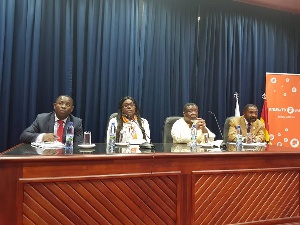 Mrs. Asante-Apeatu, others at the GIMPA-PEF 2018 Budget Symposium
Mrs. Asante-Apeatu, others at the GIMPA-PEF 2018 Budget Symposium
In every political system within a well-structured governance eco-system, there is the need to encourage the role and operations of Civil Society Organizations in ensuring that various governments are delivering their campaign promises and working in the utmost interest of the citizenry.
Speaking on ‘Governance Structures and Performance Monitoring of the 2018 Budget in the Private and Public Sectors: Role of Civil Society’ at the GIMPA-PEF 2018 Budget Symposium, the Executive Director of Good Governance Africa (GGA) Mrs. Tina Asante-Apeatu charged all Civil Society Organizations (CSOs) to hold public officials accountable, make sure public resources are used efficiently and effectively to achieve the desired outcomes, give an independent and objective opinions on the budget proposals and also aid in educating the general public on the general overview of government’s budget.
Ghana’s 2018 budget and economic plan is to provide jobs for the citizenry and create an enabling environment for business to thrive; both indigenous and foreign businesses.
Mrs. Asante-Apeatu further stated that ‘every government budget must aim at reducing regional disparities through taxation and expenditure policy to encourage the setting up of production units in economically backward region’.
Government budget is used to prevent business fluctuations of inflation or deflation to achieve the objective of economic stability.
The government aims to control the different phases of business fluctuations through its budgetary policy. Policies of surplus budget during inflation and deficit budget during deflation helps to maintain stability of prices in the economy.
The symposium, which is the 5th in a series, was under the auspices of GIMPA School of Governance and Leadership in collaboration with Private Enterprise Federation (PEF).